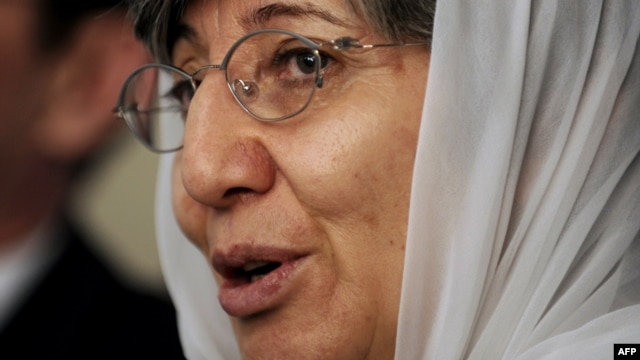Afghanistan: Oxfam says women excluded from peace talks with Taliban
| Publisher | Radio Free Europe/Radio Liberty |
| Publication Date | 24 November 2014 |
| Cite as | Radio Free Europe/Radio Liberty, Afghanistan: Oxfam says women excluded from peace talks with Taliban, 24 November 2014, available at: https://www.refworld.org/docid/548ea91a26.html [accessed 22 May 2023] |
| Disclaimer | This is not a UNHCR publication. UNHCR is not responsible for, nor does it necessarily endorse, its content. Any views expressed are solely those of the author or publisher and do not necessarily reflect those of UNHCR, the United Nations or its Member States. |
November 24, 2014
By RFE/RL
 Afghan women's role and participation in the negotiations with the Taliban has been largely "invisible," says Sima Samar, Afghanistan's former minister of women's affairs.
Afghan women's role and participation in the negotiations with the Taliban has been largely "invisible," says Sima Samar, Afghanistan's former minister of women's affairs.
The aid agency Oxfam says Afghan women are being excluded from efforts to negotiate peace with the Taliban and warned that hard-won rights could be bargained away unless more is done to include women in the peace process.
In a report released on November 24, Oxfam said it has tracked 23 rounds of peace talks since 2005 and not one Afghan woman participated in discussions between the Taliban and international negotiators.
Oxfam also said that just nine of the 70 members of the Afghan High Peace Council are women, and that their role is largely symbolic.
It said many gains made for protecting women's rights during more than a decade of foreign intervention already have been rolled back, making it "clear that women's rights have been a low priority."
The former minister of women's affairs of Afghanistan, Sima Samar, voiced similar concerns about women's limited role in the Peace Council.
Afghan women's role and participation in the negotiations with the Taliban has been largely "invisible," Samar told RFE/RL's Radio Free Afghanistan.
Samar, who currently heads Afghanistan's Independent Human Rights Commission, said the Afghan people should take responsibility to promote women's rights and human rights in general.
She added that they also "should not depend 100 percent on the international community."
Samar said she hoped Afghanistan's new leadership "will implement their election promise" and boost women's role in society.
President Ashraf Ghani, who took office in September, has said he wants talks with the Taliban and stressed that he will work to bolster the status of women.
On November 23, Taliban spokesman Zabihullah Mujahid told Reuters that the Taliban was in favor of including woman in peace talks as well as any future government, but only once all foreign troops have left Afghanistan.
Since the collapse of the Taliban administration in 2001, Afghan women gained access to education and work. Women hold almost one-third of parliament seats under an official quota.
However, in recent years attacks against women have intensified. Women working as police, soldiers, lawyers, teachers, doctors, politicians, and rights activists have been attacked or killed as a warning to others to stay in their homes and remain dependent on their fathers, husbands, and sons.
With reporting by Reuters, AP, and AFP
Link to original story on RFE/RL website
